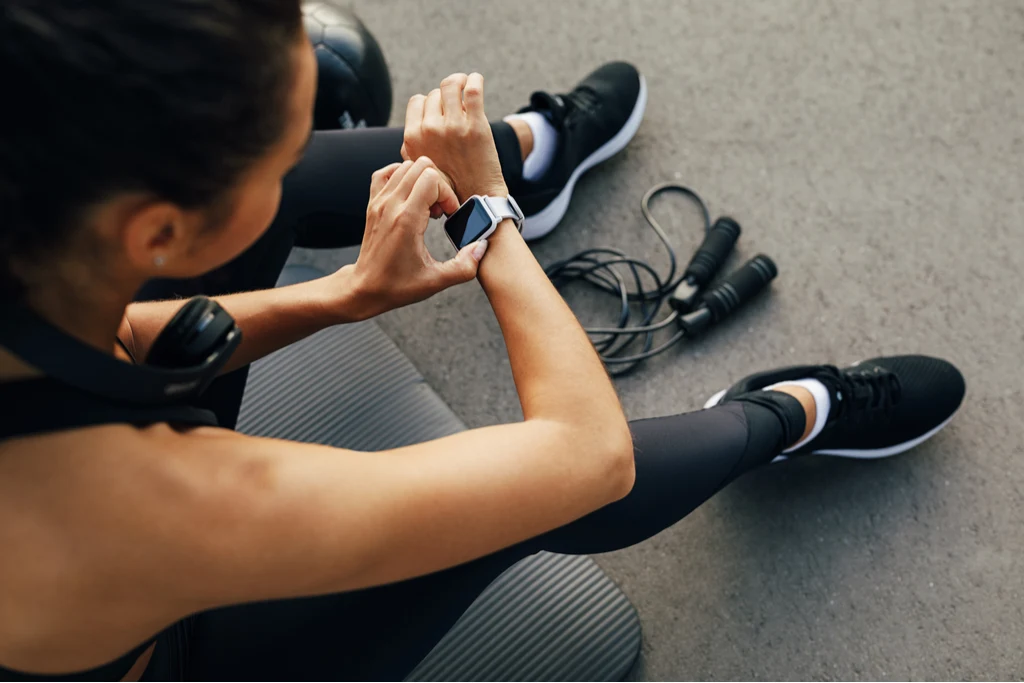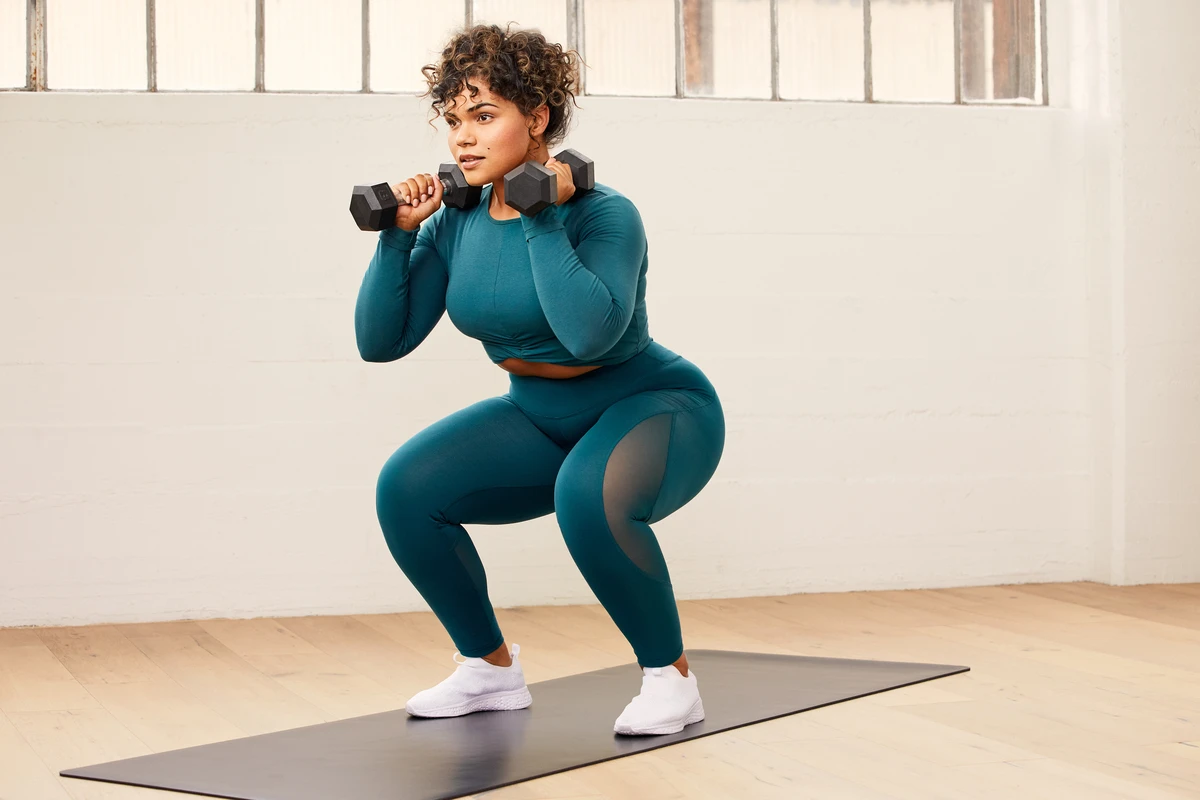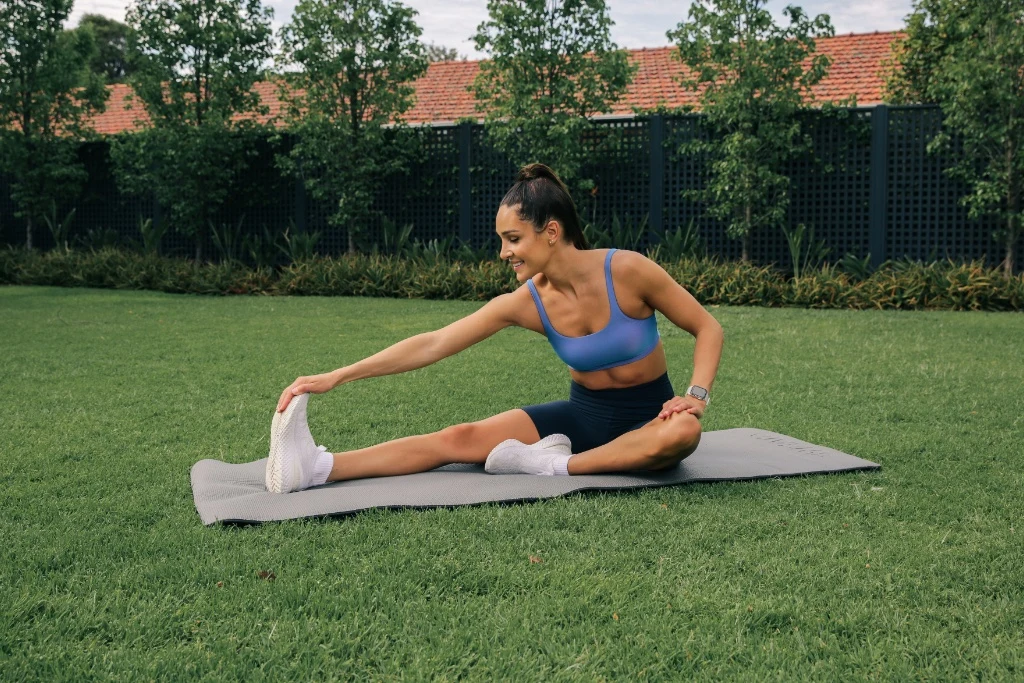18 Fitness Questions Every Beginner Has, Answered
From the best time of day to work out to measuring your progress.

June 8, 2018 - Updated June 12, 2025

When it comes to getting started on your fitness journey and finding an exercise routine that actually works for you, it can be hard to know where to start with so many training styles, opinions and new terminology to get your head around.
To make it easier for you to start strong and maintain your momentum at every stage of your fitness journey, we’ve answered some of the Sweat Community’s most common fitness questions. Whether you’re getting ready for your first workout or are a few weeks into a new routine, we’ve got you covered!
Before your first workout
How often should I exercise?
This one comes down to your goals, lifestyle and current fitness level. If you’re new or returning to exercise, aiming for two to three weekly workouts is a great starting point to build your fitness while making sure your body has plenty of time to recover. Find it more achievable to exercise daily but for short bursts? Britany’s Daily 10 and Daily 20 Challenge options in the Sweat app are two of our most popular programs.
If you’re following a Sweat program, you’ll find resistance, cardio and recovery sessions all included in your weekly plan. Take things at your own pace when you’re at the beginning of your fitness journey and don’t forget, there’s no shame in repeating a week if you need to!
Once you get into the swing of your routine, you can add more workouts to your schedule and as your fitness increases, you might find yourself enjoying between four and six workouts each week.
Remember, making time for at least one full rest day in your week should always be a non-negotiable and including multiple workouts in one day can be a recipe for burnout. If active recovery is more your speed, adding in gentle movement like walking, cycling or yoga is a great way to help build your fitness and stay active throughout the week

What time of day is best to work out?
The best time to work out is… whenever you can fit it in! Have a look at your schedule and figure out what time of day best suits your lifestyle.
If your routine is flexible, think about when you feel the most energetic, or when you would prefer to exercise. Morning workouts can be an energising way to start the day for some, while others prefer working out after work to unwind, blow off some steam or set yourself up for a great sleep.
Remember, consistency with exercise matters more than consistency with when you exercise.
How long should my workouts be?
This one comes down to your lifestyle, goals and preferred training style.
If you love high-intensity workouts, you’ll know a quick 20-minute session can be highly effective, but if structured weight training is more your thing, you might need to set aside 40-60 minutes. No matter what your starting point is and what your fitness goals are, there will be a Sweat program that suits your goals and the perfect workout length will be different for everybody.
Do I need to follow a training program?
While we always recommend following a program, it really depends on how you like to train and what you want to achieve. For example, if you have specific goals around building strength and muscle mass, we would definitely recommend following a program as it will factor in recovery, muscle group splits, progressive overload and training for hypertrophy. Following a program can also take the guesswork out of your training by giving you a clear structure each week.
If you’re not chasing specific results and enjoy choosing your workout based on what you’re in the mood for or how much time you have, you might enjoy creating your own workout routine from what’s on offer in the On Demand section of the Sweat app

Do I need to warm up before my workouts (and cool down afterwards)?
Pleeeeease don’t skip your warm-up. We know it can be tempting to get straight into it, especially if you’re short on time, but a proper warm-up is really important.
A good warm-up prepares your body for activity, raises your body temperature and increases blood flow to your muscles gradually, reduces your risk of injury and can improve your workout performance. It doesn’t need to be fancy or super long - a simple warm-up can be five minutes of cardio or some dynamic stretching of the muscles you are about to use. Each workout in the Sweat app also comes with optional warm-ups you can follow.
When it comes to cooling down, set aside at least five minutes after your Sweat session to allow your temperature and cardiovascular system to gradually return to their normal state. Your cool down could include everything from stretching to foam rolling to light cardio, such as walking or a gentle cycle.
What if you only have time for one, not both? Although we always want you to warm up and cool down and don’t recommend making a habit of always skipping one, our vote would be to prioritise your warm-up to minimise injury risk and optimise performance.
What training style should I do?
Figuring out which training style is right for you is a personal decision, but we think it’s so much easier to show up consistently and maintain motivation when you love what you’re doing.
You’ll find everything in our Sweat programs lineup from boxing and barre to strength training, Pilates, yoga and mobility.
If you’re not sure what training style you’ll get the most enjoyment out of, why not try a few different workouts from the On Demand section of the Sweat app, or opt for a program that combines multiple training styles like Katie Martin’s The 3-2-1 Method for a blend of strength, Pilates and cardio.
Is cardio or strength training more effective?
We recommend including a mixture of cardio and strength training in your routine. Why both and not just one? Because you want to reap the benefits of each!
According to the American Cancer Society, two to three strength-based workouts each week can result in significant health benefits, such as increased muscle mass, stronger bones, boosted metabolism, better posture, balance and joint flexibility. Research shows it also can boost heart health and have a positive impact on your mental health.
Regularly increasing your heart rate and blood flow by adding cardio into your routine can also promote heart, brain, skin and lung health, as well as improve your sleep and energy levels.
If you’re including cardio and weight training in one workout, start with the training style you want to get the most out of in your session while you have the most energy in the tank.

Should I lift weights for strength training?
This depends on your goals and your fitness level. For beginners, we recommend starting with bodyweight strength workouts or light weights to build your confidence and master your form.
Once you’re feeling good, you will need to keep challenging yourself (aka progressive overload) if you want to see your strength improve, but which weights you use is totally up to you. Many women enjoy weight training with gym machines or free weights such as dumbbells, kettlebells or a barbell, while others prefer bodyweight workouts. There are plenty of ways to make bodyweight exercises more challenging so find what works for you!
How do I make sure I’m performing each movement with correct form?
Learning to perform each exercise with the correct form is so important when it comes to strength training and you should always prioritise form over weight. It will ensure you’re targeting the right muscles, help prevent injury and make your workouts more effective.
In the Sweat app, every exercise comes with instructions and a video to help you master every movement. If you’re working out with a friend or with a trainer in the gym, ask them to check your form (a mirror can also help keep you on track if you’re training at home!).
If you notice you can’t maintain good form with a high number of reps or a heavy weight, dial it back. Form comes first. Always.
What equipment or clothing do I need to start?
Great news, if you’ve got some comfy clothes to exercise in and a good pair of sneakers, you’ve got plenty of options to get started with - no equipment required.
If you’ve chosen a home program, check the equipment requirements and make sure you’ve got everything you need. You can also enter your equipment in the Sweat app so that for any exercise you can’t do because you’re missing the equipment, we’ll give you another option. The Sweat Community have plenty of tips for setting up your space and getting the most out of your at-home training!
Chosen a gym program? Amazing! If you’re not already confident in using gym machines, a staff member will be more than happy to give you a tour and a run through on how to use gym equipment.
In terms of activewear, here are our top tips:
When it comes to your shorts, leggings and workout tops, fabric is key. If you find yourself getting sweaty during every workout or live in a warmer climate, look out for moisture-wicking fabrics which will draw the moisture away from your body.
Do your breasts a favour and get your sports bra professionally fitted if you’re not feeling supported. The bra should fit snugly to your skin but not be restrictive, and you might opt for a different bra depending on whether your choice of movement is low, medium or high impact.
Find underwear that you can wear comfortably under your shorts or leggings. The last thing you want is a wedgie mid-workout!
Choose workout shoes that suit your style of training and support your feet effectively. If you enjoy running and strength training, you might find it best to have different shoes for each.
Exercising outdoors? Try and opt for bright and reflective clothing to improve your visibility and stay safe.
Is there any fitness terminology that would be helpful for me to know?
The fitness industry LOVES an acronym, but if you’re new to regular exercise, it can be hard to know what it all means. Before you get started, read our guide to fitness terminology so you can tell your AMRAP from your RPE.

When you’ve started working out
I’m struggling to get through my workouts. What should I do?
During the first few weeks of a new fitness routine, there’s a chance you might struggle to reach the end of a workout or you may need to take regular breaks. That’s ok! The important thing is to keep showing up for yourself as your fitness starts to build.
While it’s great to challenge yourself, pushing yourself too hard can lead to burnout or injury, so listen to your body, recognise your limits and be patient as your fitness, strength and endurance improves. Good things take time!
If you’re struggling during your workouts, here are some ways to reduce the difficulty:
Modify exercises where needed, such as completing push-ups on your knees instead of your toes.
Simply don’t like an exercise that’s featured in your workout? That’s okay! Use the Exercise Substitution feature to swap it out for another movement.
Take longer breaks in between sets.
Reduce the number of reps or decrease your weight load. When it feels easier, you can add more!
I’m feeling really sore. What is the best thing to do?
If you’re new to regular movement, it’s common to wake up the day after a workout feeling pretty sore and sorry for yourself. If you hear people talking about DOMS, this is what they’re referring to - delayed onset muscle soreness.
This soreness is a result of the micro-tears to your muscle fibres which happen when you work different muscles or increase the intensity of your workouts. While it’s definitely a sign you’ve been working hard, it’s natural to see a decrease in DOMS as your body gets used to regular training. You can also see your progress by tracking your reps, weight load or the number of reps within a timeframe.
If you’re feeling sore, take an active recovery day with some yoga or low-intensity cardio such as walking or cycling to get the blood flowing to your muscles and alleviate any stiffness, and reduce the intensity of your workouts to allow your body to fully recover.
To support your recovery even more, focus on drinking plenty of water each day to stay hydrated, and nourish your body with plenty of protein, fruits and vegetables to replenish your vitamins and minerals.
How often do I need a rest day?
It’s important to include rest days in your routine to allow your body to recover, adapt and rebuild - no matter how fit and strong you are. All Sweat programs have rest days built into them, and even if you’re training different muscle groups on different days, you should still allocate at least one day for rest each week.
If you’re sick or injured, take a break and speak to your doctor to come up with a plan for safely returning to exercise. Remember, you’re in this for the long game.

When it’s becoming a habit (woohoo!)
How do I stay motivated to work out?
Motivation can come easily at the start of a new week, month or year but there will definitely be days when you just can’t be bothered. That’s normal and you’re not alone - motivation comes in waves for all of us and there will always be days when it will feel much harder to get moving.
This is how we like to maintain motivation when we're just not feeling it:
Regularly set goals for yourself to have something to work towards, challenge yourself and keep yourself accountable.
Harness the power of intrinsic motivation and focus on how you want to feel.
Focus on establishing a strong routine. When working out becomes a habit, it’s easier to block out excuses and show up even when you feel less motivated.
Remind yourself of the benefits of exercise and how good you will feel afterwards, or make a list of reasons about why you exercise that you can look back over when the fitness inspiration just isn’t there.
Find ways to hold yourself accountable, such as a fitness buddy, sharing about your journey on social media, or scheduling your workouts before the week begins.
Choose a training style you enjoy - sticking to it will be so much easier!
Start small! “When I’m unmotivated, I set a timer for 10-15 minutes and just do a quick bodyweight workout, which is exactly what The Daily 10 Challenge is,” says Britany Williams.
How can I measure my progress?
When you start any fitness routine or program, you want to see results whether that’s in the form of improved energy, confidence, strength, fitness, muscle mass or sheer enjoyment of exercise.
Think about what your unique goals are and how those would be best measured.
If you’re wanting to build strength with progressive overload, you could use the Sweat app to keep track of the weights you’re lifting.
If you’re wanting to feel more confident and healthy, you could use a journal to record how you’re feeling.
If you’re wanting to build endurance, you could complete regular fitness challenges and track your progress.
If you’re trying to gain muscle or lose fat, photos and measurements can be more helpful than the scales.
The Activity tab in the Sweat app is also a great place to keep an eye on your daily and weekly goals, as well as a one-stop shop for all your past workout achievements.
How do I set good fitness goals?
We’re big believers in the SMART goals framework, as this allows you to set goals that are Specific, Measurable, Achievable, Relevant and Time-bound. It’s a great way to approach both short and long-term fitness goals as it requires you to really drill down on what you want to achieve - and the plan you need to put in place to get there.
We recommend breaking down any big goal you might have into smaller goals so you can keep an eye on your progress and celebrate your wins along the way.
What else can I do to take care of my health?
While there are so many benefits to regular exercise and structured training, it’s just one part of the picture when it comes to your health and wellbeing.
As you get used to your new routine, try to include more movement and exercise snacks in your day-to-day life. This could include everything from taking the stairs or adding in more steps to your day, such as during meetings or on your commute or simply running around in the park with your kids.
Now that you’re working out regularly, you might find you get hungry more often. Fill your fridge and pantry with nourishing foods and plenty of fruit and vegetables and use the Food section of the Sweat app to discover quick and easy meals the whole family will enjoy. At the moment we can’t get enough of Leah itsines’ brand-new recipe collection.
Getting a good night’s sleep can also impact your physical and mental health, so make it a priority. From increased energy to greater focus and a better mood, aim for between seven and nine hours each night.
Last but not least, show your mind some love by taking the time to fill up your cup with your favourite and self-care practices. Whether it’s some me-time with a good book, an evening bath, meditation or journalling, self-care looks different for everybody but is such an important part of a well-rounded routine.

A more empowered you starts with Sweat, and our editorial team is here to bring you the latest fitness tips, trainer recommendations, wellbeing news, nutritional advice, nourishing recipes and free workouts.
* Disclaimer: This blog post is not intended to replace the advice of a medical professional. The above information should not be used to diagnose, treat, or prevent any disease or medical condition. Please consult your doctor before making any changes to your diet, sleep methods, daily activity, or fitness routine. Sweat assumes no responsibility for any personal injury or damage sustained by any recommendations, opinions, or advice given in this article.
Fitness